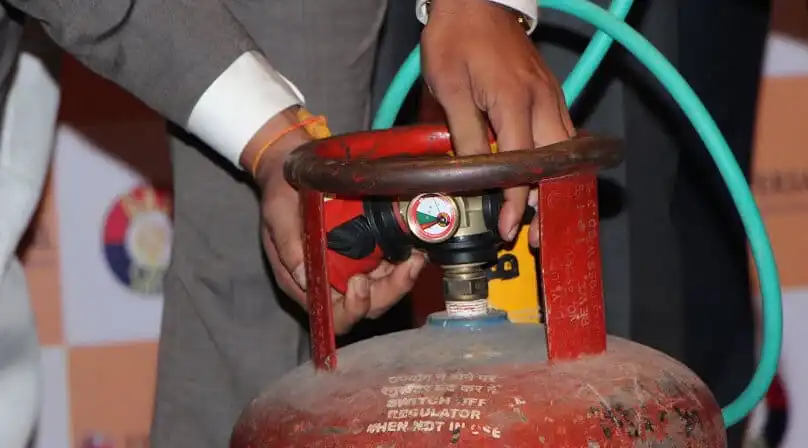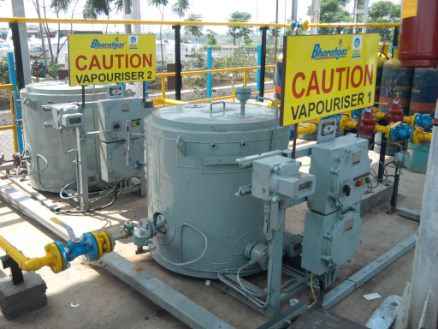Shreeji Krupa Bharat Gas: Your Reliable LPG Partner
Commercial Usage Our team of seasoned experts, with extensive industry experience, will assist you in selecting the optimal combustion system, appropriate controls, and equipment. We guide you through the entire conversion process, ensuring you choose the right vendor. Our esteemed customers have successfully transitioned from High-Speed Diesel, Light Diesel Oil, Furnace Oil, Superior Kerosene Oil, Coal, and Electricity to LPG. They commend us for our comprehensive conversion services and LPG storage solutions that guarantee uninterrupted, hassle-free operations.
Industries Benefiting from LPG:
Hotel & Hospitality: Ideal for boiling, stewing, frying, grilling, toasting, broiling, roasting, baking, and more.
Food Processing: Perfect for tea drying, biscuit baking, bread baking, cocoa bean roasting, coffee roasting, chicory roasting, cornflake production, and various other drying, roasting, and frying processes.

Comparing Various Fuels
Fuel Atomization: The atomization of fuel requires external energy (by pump or compressor) to atomize before injecting the fuel into the combustion chamber. Heavier fuels have higher atomization costs. Gaseous fuels do not require atomization, giving them an advantage of 2-3%.
Latent Heat of Vaporization: During combustion, liquid fuel gets converted to vapor, and the vaporization process takes away the latent heat of vaporization from the combustion heat. Gaseous fuels do not require vaporization, hence no heat loss from the combustion process.
Excess Air: All fuels except gases are burnt with more positive pressure, requiring combustion air to be fed at higher pressure. Gaseous fuels can be burnt 100% at atmospheric pressure, requiring less combustion air pressure and resulting in less stack losses. This gives gaseous fuels an advantage of more than 10% over liquids in terms of exhaust losses.
Burning Speed: LPG burns faster than liquid and solid fuels, ensuring no unburnt fuel goes into the exhaust, further improving efficiency, especially in high consumption applications.
Indirect Advantages of Using Gas
- Future Fuel: Gas is considered the fuel of the future
- Low Maintenance: Equipment maintenance is minimal.
- Direct Heating: Direct heating is possible with gas.
- No Vaporization Losses: There are no vaporization losses from the storage tank, unlike liquid fuels.

| LPG | High Speed Diesel | Electricity | Furnace Oil | Coal | Solar energy |
|---|---|---|---|---|---|
| Positives | Negatives | Negatives | Negatives | Negatives | Negatives |
| A higher calorific value | Produces harmful emissions and residue | Electricity heating has a higher maintenance cost | Higher installation cost | It is a non-renewable resource | Dependent on weather and availability of sunlight |
| Does not produce any smoke | Increasing price due to increased demand | Causes dry air in the environment | Expensive running or energy costs | Coal contains maximum CO2 per BTU | Installation is expensive |
| Does not have a solid residue | Diesel is cruder and messier | Highly potential to fires | Higher maintenance costs | Severely harmful environmental, social, health and safety impacts | Inefficient for heating |
| Does not emit harmful gases on burning | Diesel production requires large farmlands which damages the land | Emits dangerous levels of carbon monoxide | More restricted to boiler usage only | The high cost of transportation | Requires a lot of storage space |
| Easy and safer to store than other fuels | Higher contamination during storage | Reduced moisture in the air can cause respiratory disorders | Oil is naturally toxic, releases carbon dioxide | Coal ash is difficult to dispose | Consumes more time for heating |
| Low ignition point | Exhaust fumes can seriously harm and even kill people exposed to it | Highly expensive and inefficient | Oil containers are not compact and not easy to access | Coal emissions cause asthma and lung cancer | – |
| It has a controllable combustion | – | Electricity comes from fossil fuels like coal and petroleum which is most polluting | Hard to detect leakage, which makes it less safe to use and store | – | – |
| It burns at a moderate rate | – | – | – | – | – |
| Highly Eco-friendly | – | – | – | – | – |
| Better for health as there are no harmful gas emissions | – | – | – | – | – |
| Product | LPG | Electricity | HSD | LDO | FO | Kerosene | Wood |
|---|---|---|---|---|---|---|---|
| Unit | 1 KG | 1 KWH | 1 LTR | 1 LTR | 1 KG | 1 LTR | 1 KG |
| GCV in kcal/kg | 11800 | 860 | 10500 | 10700 | 9500 | 10420 | 2800 |
| Density of Fuel | N/A | N/A | 0.82 | 0.86 | 0.93 | 0.78 | N/A |
| Fuel efficiency % | 85 | 100 | 80 | 80 | 75 | 75 | 25 |
| Effective CV PER UNIT | 10030 | 860 | 6888 | 6902 | 7125 | 6095 | 700 |
| Rate (NEW DELHI) | 67 | 7 | 55 | 57 | 50 | 46 | 5 |
| Equivalent LPG Kg Required for unit | 1 | 0.0857 | 0.6867 | 0.7338 | 0.7103 | 0.6077 | 0.0697 |
| Saving in % as on Date | 0 | 0.18 | 0.16 | 0.135 | 0.048 | 0.11 | 0.065 |
| Neutral point of LPG Cost | 81.68 | 80.09 | 77.68 | 70.39 | 75.69 | 71.73 |
Benefits of LPG
LPG (Liquefied Petroleum Gas) is an outstanding energy source due to its origin, benefits, applications, and industry. As a clean, lower carbon, efficient, and innovative energy, it offers numerous advantages to consumers, industry, and the environment. Here are some key benefits:
- Lower Greenhouse Gas Emissions*: LPG emits fewer greenhouse gases compared to petrol, diesel, and electricity on an energy-equivalent basis.
- Simpler Maintenance: LPG combustion systems are easier to maintain due to fewer accessories and less frequent cleaning, resulting in fewer shutdowns and lower maintenance costs.
- Cost-Effective: A high proportion of LPG’s energy content is converted into heat, making it up to five times more efficient than traditional fuels like Diesel (HSD & LDO) and Furnace Oil (F.O.), leading to less energy wastage and better use of resources.
- Accurate Temperature Control: Easy and precise temperature control ensures superior product quality.
- Accessibility: LPG is accessible to everyone everywhere today without major infrastructure and investment.
Instant Heat: LPG provides instant heat, allowing the desired temperature to be reached quickly, increasing productivity. - Less Excess Air Required: LPG combustion requires less excess air, resulting in minimal burning losses in melting and heating processes.

 BOOK A CYLINDER
BOOK A CYLINDER